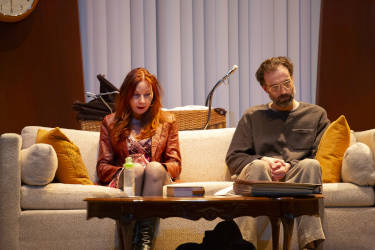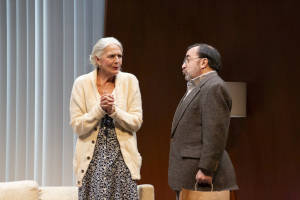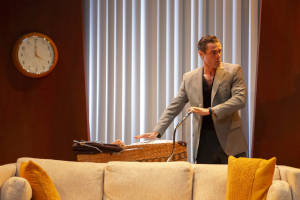
|
Beate Hein Bennett
…What an Atmosphere… “Night Sings Its Songs”
Jon Fosse, the contemporary Norwegian poet/novelist/playwright who received the Nobel Prize for Literature in 2023, touches a raw nerve with his play “Night Sings Its Songs.” If COVID made us sensitive to social isolation and mutual alienation, this play is for our post-pandemic times. If the ubiquitous Smartphone with its texting facility and the social media platform X (formerly Twitter) made us monosyllabic and resistant to sustain any communication beyond the basic and the banal, then Jon Fosse already anticipated this mode of communication in the dialogue of this play that premiered in Stavanger, Norway in 1997. The play follows the painful unraveling of a young couple’s marriage through a succinct sequence of minimalist verbal exchanges rife with depression on the husband’s part and all the signs of a nervous breakdown on the wife’s part. Even the presence of their newborn baby does not enable them to overcome their profound misalliance. He is a clinically depressed writer who has not found a willing publisher for his work in years and spends most of his days and nights on the sofa reading, unwilling to go out or participate in the mundane tasks of housekeeping. She is on maternity leave from work and longs for any kind of social interaction; she blames him for the poisonous atmosphere in their home that keeps friends away and even his parents stay but a few moments just to take a look at the baby—they are equally monosyllabic, almost humorously so. In the course of a few hours into the dark of the night, the clock ticks inexorably towards a catastrophe.
The translation by Sarah Cameron Sunde captures the ambience of lives on the brink where banal daily tasks become triggers of aggression countered by passive resistance, where there is no more discernment possible between the truth and the falsehood of a statement, where feelings of love have become a bittersweet memory. The sparse language devolves in a sharp rhythmic dialogue punctuated by long silences and brief explosions of fury. Jerry Heymann has directed this dark drama—Strindberg redux—with deft movement and progressive tension. Scene Designer Brian Dudkiewicz has created a space of tall inwardly curving walls of wood suggesting a modern minimally furnished apartment-- a prominent clock on the center wall suggests the proverbial race to the bottom while the only seating consists of the sofa and one armchair creating an (intended?) awkward situation when the husband’s parents come to visit. Paul Hudson’s lighting design adapts to the subtle changes in mood primarily through changes in color and focus.
The nameless Young Woman and Young Man are played by Susan Lynskey and Kyle Cameron. Fosse’s script indicates precise line lengths which creates a specifically accented rhythm of speech. Both actors maintain their individual rhythms of speech—hers is marked by an almost neurotic abrupt nervousness while he responds mostly with silence, or at times briefly attempting to cajole followed by non-action. It is a difficult duet—a slow dance on a killing ground. When the parents burst in on them for a visit, he is indifferent and she is clearly resentful—it is a brief painfully comic interlude. The Father played by Steven Rattazzi displays a monosyllabic indifference to his son and daughter-in-law and an almost comic disinterest in his baby grandson. Jenny Allen as The Mother tries to repress her discomfort with the young couple and is eager to see the baby for whom she brought a gift, a lovely little blanket. Both parents clearly can’t get away fast enough. The actors are superb in playing the banal surface while revealing the profound darkness that envelops all of them. Last not least is Ken King as Baste, a brash young man and friend, now lover of the Young Woman. Ken King gives him a brazen slightly threatening boyishness, in sharp contrast to the morose husband. However, he is the catalyst that triggers the ultimate unraveling and tragic end. |
| recordings | coupons | publications | classified |



